 The Philadelphia Story is a deservedly revered chestnut. Featuring several stars at the height of their charismatic beauty, The Philadelphia Story is a simple situation comedy built on a ancient conceit: two perfect couples, who haven't quite gotten it together to get/stay together, almost ruin things entirely before resolving everything in a double-wedding finale. The simple plot is loaded with delightful artifice: exhilarating dialogue (delivered my master patterers) of the sort no actual person would ever actually say; finely crafted suspense (you know it'll all work out but you still wanna see how); and an accumulation of complicating, amusing characters (appropriately inhabited by captivating character actors) who get in the way along the way. (Indeed, I often recommend the Philip Barry script as a great example of how to write dynamic comedy dialogue in complex character configurations.) Moreover, the 1940 film -- directed by George Cukor -- is a master work of timing, grace and glamor. All of which makes it all the more surprising that I was so fundamentally underwhelmed when I paid close attention to the performance of my favorite character as crafted by...
The Philadelphia Story is a deservedly revered chestnut. Featuring several stars at the height of their charismatic beauty, The Philadelphia Story is a simple situation comedy built on a ancient conceit: two perfect couples, who haven't quite gotten it together to get/stay together, almost ruin things entirely before resolving everything in a double-wedding finale. The simple plot is loaded with delightful artifice: exhilarating dialogue (delivered my master patterers) of the sort no actual person would ever actually say; finely crafted suspense (you know it'll all work out but you still wanna see how); and an accumulation of complicating, amusing characters (appropriately inhabited by captivating character actors) who get in the way along the way. (Indeed, I often recommend the Philip Barry script as a great example of how to write dynamic comedy dialogue in complex character configurations.) Moreover, the 1940 film -- directed by George Cukor -- is a master work of timing, grace and glamor. All of which makes it all the more surprising that I was so fundamentally underwhelmed when I paid close attention to the performance of my favorite character as crafted by...approximately 21 minutes and 39 seconds
13 scenes
roughly 19% of film's total running time
13 scenes
roughly 19% of film's total running time
Ruth Hussey plays Elizabeth Embrie, the tart-tongue lady photographer who spends a lot of time with "serious" writer Macauley Connor (James Stewart in a trophy-snagging performance) while he "slums" penning stories for a glossy gossip rag.
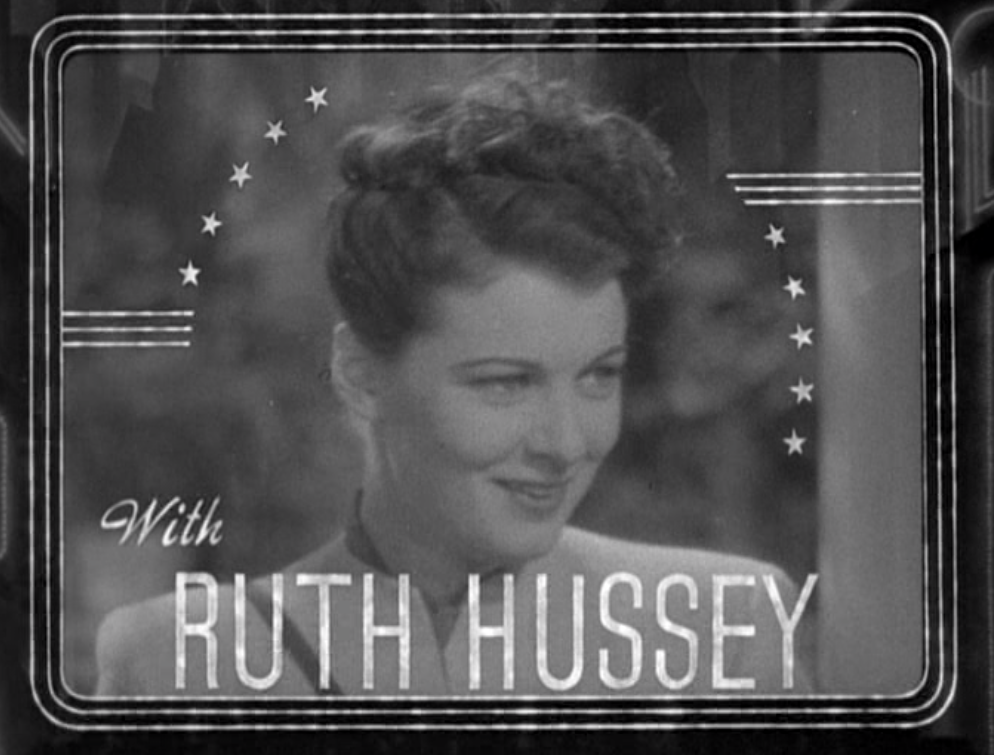 The role of Elizabeth Embrie demands some pretty heavy lifting. Liz's sardonic cracks, often from the sides of the scene's action, must be delivered with acid wit and incredible charm. Liz must be beautiful, strong, confident -- and a near complete doormat for Macauley's cluelessness -- while maintaining formidable, feminine appeal. Liz must also show the wounds of her working class past with unapologetic clarity and verve.
The role of Elizabeth Embrie demands some pretty heavy lifting. Liz's sardonic cracks, often from the sides of the scene's action, must be delivered with acid wit and incredible charm. Liz must be beautiful, strong, confident -- and a near complete doormat for Macauley's cluelessness -- while maintaining formidable, feminine appeal. Liz must also show the wounds of her working class past with unapologetic clarity and verve.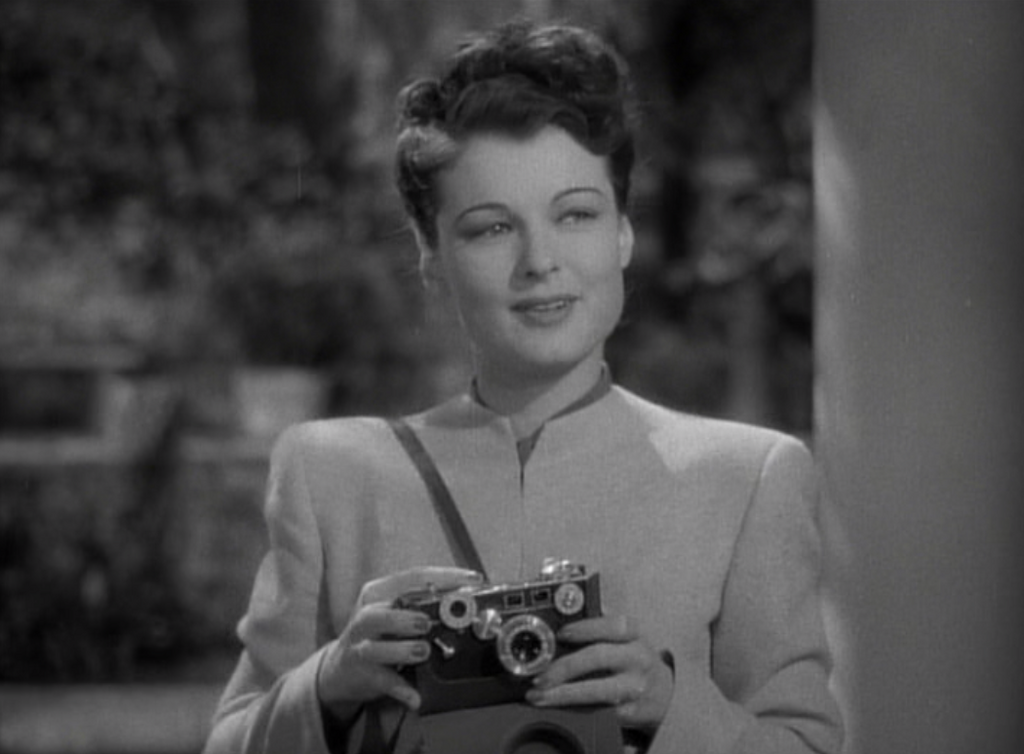 Hussey's Liz is not of this elite world even as she travels easily within it. Indeed, the character operates as a classic Broadway/Hollywood romantic comedy concoction: notably pretty but formidably witty; tough as nails on the outside but soft as a marshmallow inside; from humble beginnings but at ease mixing with (and snarking on) the upper crust; incredibly aware of her chosen man's limitations but implausibly patient while waiting for him to catch onto the fact that she's the one. It's the kind of second chair work that is the stock in trade of actresses at the edge.
Hussey's Liz is not of this elite world even as she travels easily within it. Indeed, the character operates as a classic Broadway/Hollywood romantic comedy concoction: notably pretty but formidably witty; tough as nails on the outside but soft as a marshmallow inside; from humble beginnings but at ease mixing with (and snarking on) the upper crust; incredibly aware of her chosen man's limitations but implausibly patient while waiting for him to catch onto the fact that she's the one. It's the kind of second chair work that is the stock in trade of actresses at the edge.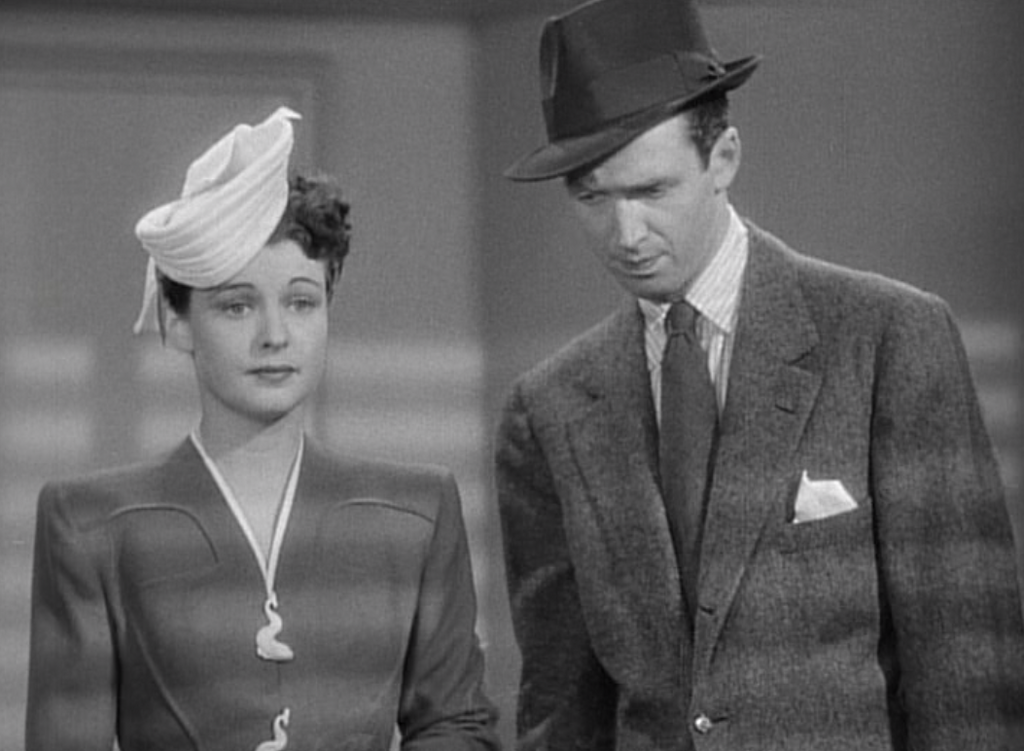 Hussey acquits the tasks obliged by the character of Elizabeth Embrie with appealing swiftness. Yet, Hussey's performance remains an essentially exterior one, with little interiority peeking around Liz's well-crafted mask. To be sure, it must have been tough to hold the screen opposite such well-crafted screen personas, whose impossibly perfect casting in these roles permitted the stars (Grant and Hepburn especially) to meld persona and performance in service of the character. But, it seems -- in crafting a screen presence powerful enough to hold its own against the wattage of such star power -- Hussey neglected the woman behind the sardonic smile.
Hussey acquits the tasks obliged by the character of Elizabeth Embrie with appealing swiftness. Yet, Hussey's performance remains an essentially exterior one, with little interiority peeking around Liz's well-crafted mask. To be sure, it must have been tough to hold the screen opposite such well-crafted screen personas, whose impossibly perfect casting in these roles permitted the stars (Grant and Hepburn especially) to meld persona and performance in service of the character. But, it seems -- in crafting a screen presence powerful enough to hold its own against the wattage of such star power -- Hussey neglected the woman behind the sardonic smile.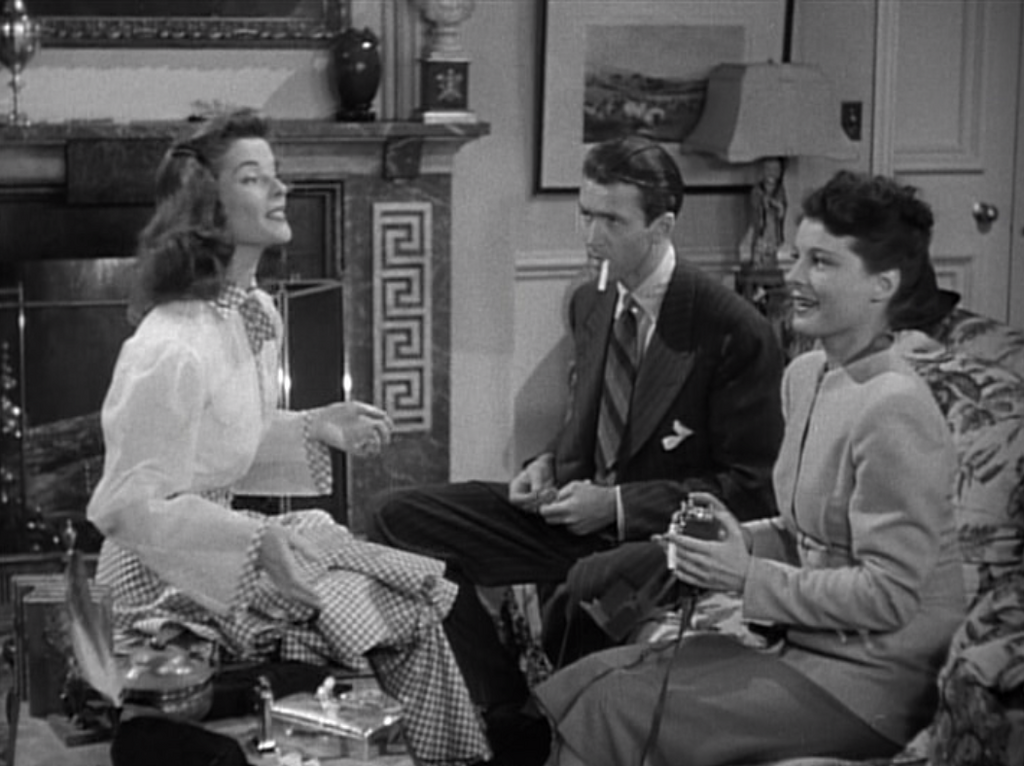 Cukor's camera work, too, does Hussey's Embrie few favors. (In the scene above -- a Hepburn tour de force -- the back of Hussey's head is center focus for a curiously long time). Worse, Hussey gets fewer closeups than perhaps any character in the film. (She might even be tied with the manservant who has nearly as many closeups as he has lines). Hussey's Liz is always an accessory to the action, on her way in or out of the scene. True, that ain't the actress's fault but it's the plot and the dialogue that keep us returning with pleasure to the character of Miss Embrie, not Hussey's performance in the role.
Cukor's camera work, too, does Hussey's Embrie few favors. (In the scene above -- a Hepburn tour de force -- the back of Hussey's head is center focus for a curiously long time). Worse, Hussey gets fewer closeups than perhaps any character in the film. (She might even be tied with the manservant who has nearly as many closeups as he has lines). Hussey's Liz is always an accessory to the action, on her way in or out of the scene. True, that ain't the actress's fault but it's the plot and the dialogue that keep us returning with pleasure to the character of Miss Embrie, not Hussey's performance in the role.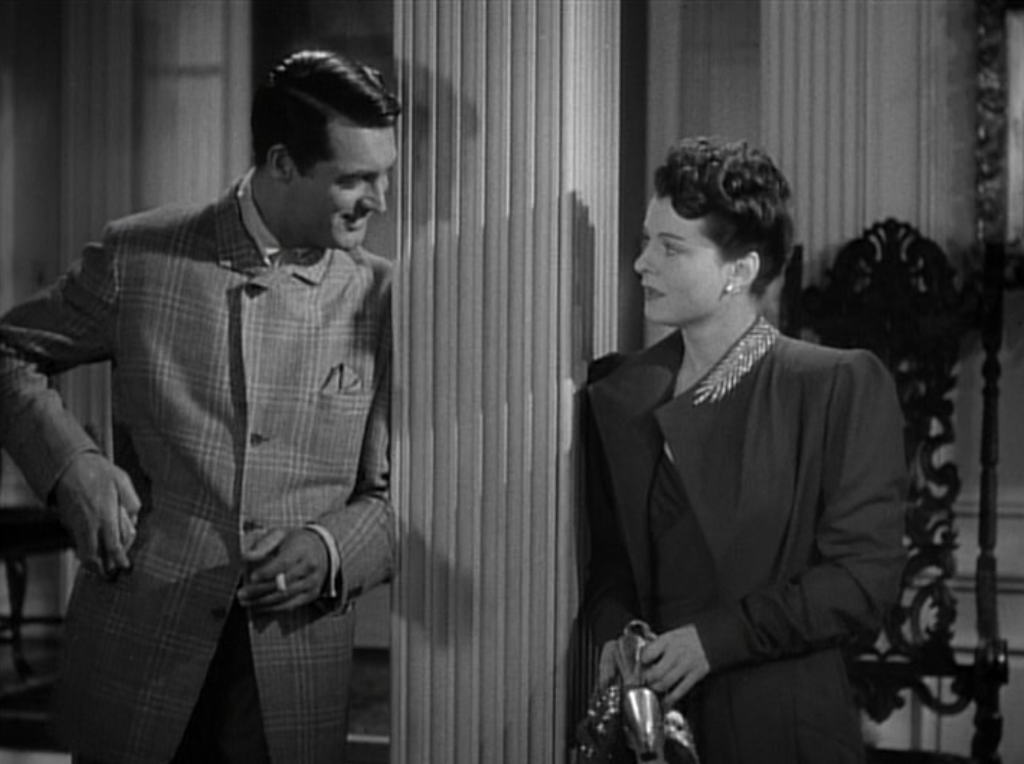 Note, too, how little Hussey reveals in her most revelatory scene -- when she and Dexter (Cary Grant, just delicious here and I'm no fan) return to the estate after a night of hard-drinking and character assassination. This scene, arguably, presents Liz at her least self-conscious and transparent. Liz lays it all -- who she is, why she does what she does -- out before a genuinely curious Dexter. In Hussey's performance, though, this scene reads as glib as each wisecracking scene before it. Hussey shows us nothing new about Liz; she just delivers some new information. Grant, on the other hand, is subtly illuminating in his quietly escalating appreciation of Liz's depth, beauty and sophistication. It's ironic: in a scene that should be the supporting actress's star turn, the leading man does brilliant support work. (Without stealing focus, I might add.) It's an effective scene, but a curious misfire -- one which reveals much about the limits of Hussey's performance in the role.
Note, too, how little Hussey reveals in her most revelatory scene -- when she and Dexter (Cary Grant, just delicious here and I'm no fan) return to the estate after a night of hard-drinking and character assassination. This scene, arguably, presents Liz at her least self-conscious and transparent. Liz lays it all -- who she is, why she does what she does -- out before a genuinely curious Dexter. In Hussey's performance, though, this scene reads as glib as each wisecracking scene before it. Hussey shows us nothing new about Liz; she just delivers some new information. Grant, on the other hand, is subtly illuminating in his quietly escalating appreciation of Liz's depth, beauty and sophistication. It's ironic: in a scene that should be the supporting actress's star turn, the leading man does brilliant support work. (Without stealing focus, I might add.) It's an effective scene, but a curious misfire -- one which reveals much about the limits of Hussey's performance in the role.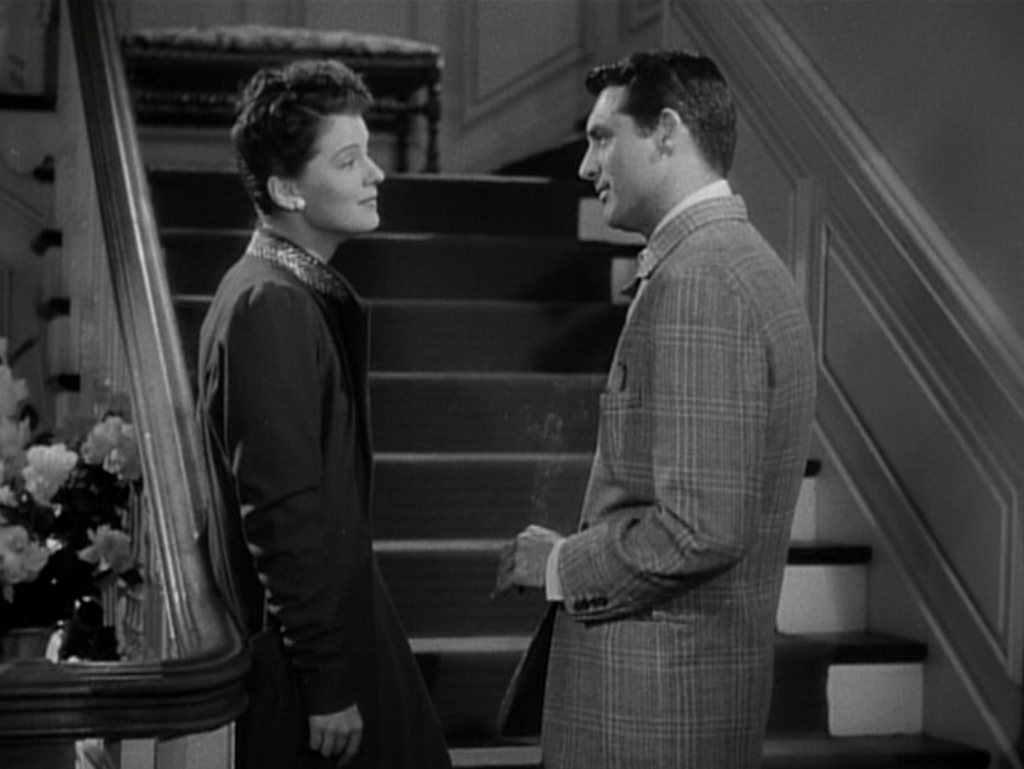
But please do not misunderstand StinkyLulu's critique as saying that Ruth Hussey's in any way "bad" in the role...
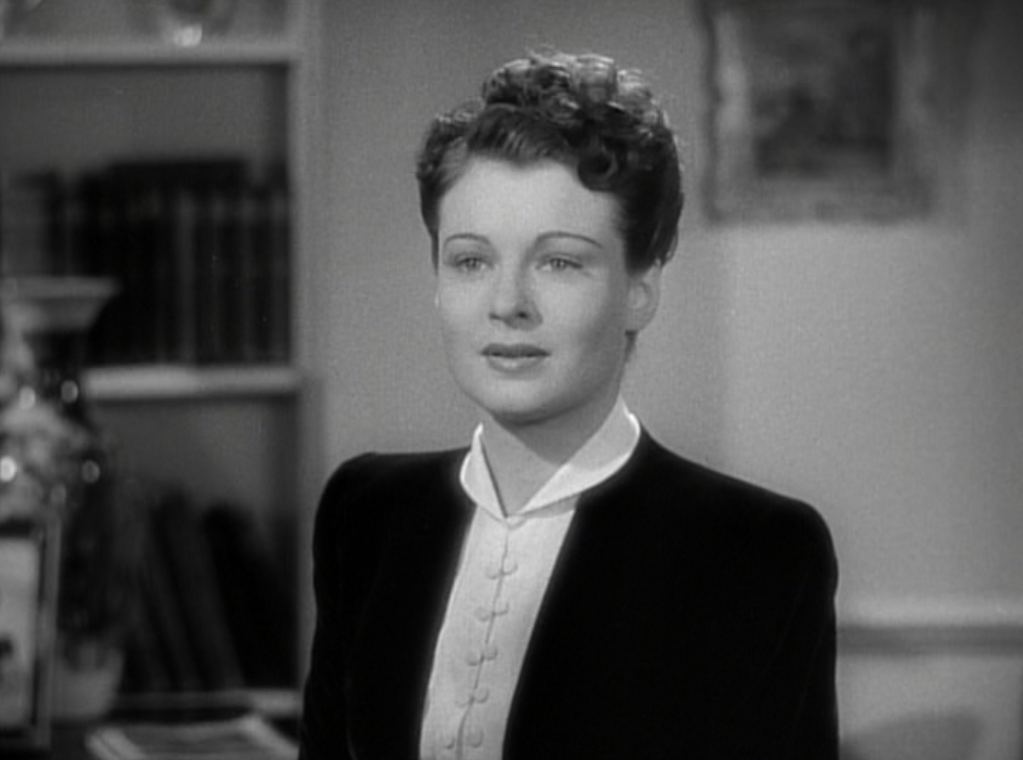 Ruth Hussey's performance as Elizabeth Embrie is often quite good. But, at every turn, the extent of her accomplishment is buoyed substantially by the part she happens to be playing.
Ruth Hussey's performance as Elizabeth Embrie is often quite good. But, at every turn, the extent of her accomplishment is buoyed substantially by the part she happens to be playing.

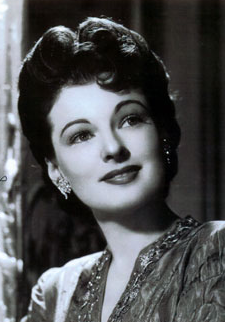
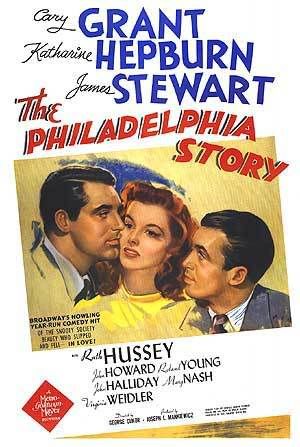
7 comments:
I must be the only person on the planet who truly doesn't "get" the appeal of "The Philadelphia Story". Sure, the acting is great and it's generally funny, but it seems to me that every scene seems to start or end with one of the characters saying "Tracy, do you know what's wrong with you..." and then launching into some monologue about what a bitch Tracy is.
I agree with you, however, that Hussey never really impressed me. It's not much of a role and she never really does anything special with it besides be eaten up alive by the Grant-Hepburn-Stewart combo.
I love the film and I love Hussey in it, but it's really difficult to see where the performance starts. Is it truly her merit or is it the screenplay's?
Eve Arden. Rosalind Russell; the depth you're talking about is why these two are so iconic in this type of role. I shouldn't be thinking of actresses I'd rather see in the role, really, for a trophy nom (that's a personal criteria). And you're right, against these three, you want an iconic performer in the fourth role, too.
You're not the only one, James. Outside of Donald Ogden Stewart and maybe Hussey (I think she's fine and competent, but not too colorful), I never thought Story marked a peak for anyone involved. Hepburn's screen comeback as Tracy is fabled and she looks sensational, but I'd rank about a dozen other Hepburn performances higher (Little Women, Morning Glory, Alice Adams, Stage Door, Bringing Up Baby, Holiday, The African Queen, Pat and Mike, The Rainmaker, Suddenly, Last Summer, and Long's Day Journey come to mind immediately)- she appears a little too forced and rehearsed- you can tell she's already played the thing a lot on Broadway, and she knows how clever she and the story are. I don't see Hepburn making a total commitment to the performance (and Story may be a light comedy, but Hepburn still could excel as an actress in her best comedies), as she did on the aforementioned occasions, and as she did more often than not.
Grant's great as always with Hepburn, but he's not given as much to do as usual. Stewart may fare the best, but I think he deserved the Oscar for The Shop Around the Corner, and I think Corner is the 1940 film that deserves the huge reputation accorded Story as the screen's perfect romantic comedy.
Yeah, this movie grates on me the more I watch it (and I've watched it at least six times). I'm conscious of how rat-tat-tat the dialogue is, how glib the situations are. And the central conceit -- Tracy has to learn humility -- is just insulting to the most beautiful and intelligent actress onscreen; and to hear it harangue after harangue from charlatans like her pompous chorus girl-chasing pa and is unpardonable.
Vertigo's Psycho is quite right in ranking this film far below the other Hepburn stuff he cites.
* er, rather, "to hear harangue after harangue from charlatans like her pompous chorus girl-chasing pa is unpardonable"
I should probably add that I really love the play, and find the film (due mostly to Grant and the kid) at times quite. And, given that Hepburn's appeal as a young woman escapes me, this is about as legible as anything else.
Post a Comment